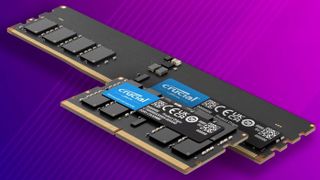
Micron has expanded the brand's extensive memory portfolio with Crucial DDR5-6400 Clocked Unbuffered DIMM (CUDIMM) and Clocked SODIMM (CSODIMM) memory kits to rival the best RAM. Although the memory kits target Intel's latest Core Ultra 200S (codenamed Arrow Lake) processors, they are compatible with any existing platform that leverages DDR5 memory.
CUDIMMs and CSODIMMs incorporate an onboard clock driver (CKD). Without diving too much into the technical aspect, the clock driver has an important role: It buffers the base clock signal between the memory controller and the memory chips. As a result, the signal's integrity remains intact, and the data rate is preserved. It effectively removes the processor's integrated memory controller (IMC) from the equation, allowing CUDIMMs and CSODIMMs to run at the advertised speed regardless of the quality of the IMC.
While other memory manufacturers are releasing CUDIMMs up to DDR5-9600, Micron is sticking with JEDEC's baseline, which is DDR5-6400. It doesn't come as a complete surprise, as Micron has been out of the enthusiast market since the company decided to retire the Ballistix brand in 2022. Since then, Micron has been releasing JEDEC-complaint (DDR5-4800) or slightly overclocked memory kits (DDR5-6000). It's uncertain if Micron will offer faster CUDIMMs and CSODIMMs down the line.
| Part Number | Description |
| CT16G64C52CS5 | Crucial 16GB DDR5-6400 CSODIMM CL52 |
| CT2K16G64C52CS5 | Crucial 32GB Kit (2x16GB) DDR5-6400 CSODIMM CL52 |
| CT16G64C52CU5 | Crucial 16GB DDR5-6400 CUDIMM CL52 |
| CT2K16G64C52CU5 | Crucial 32GB Kit (2x16GB) DDR5-6400 CUDIMM CL52 |
In the meantime, Micron's CUDIMMs and CSODIMMs only come in the 16GB flavor. However, the company has already validated memory modules up to 64GB with Arrow Lake, paving the way for up to 256GB on a consumer platform with four DDR5 memory slots. CUDIMMs and CSODIMMs with 64GB of capacity won't be available until the first half of 2025.
Micron sells the 16GB CUDIMMs and CSODIMMs as individual sticks and dual-channel memory kits with two memory modules. Currently, the only available kit capacity is 32GB, comprising two 16GB CUDIMMs or CSODIMMs. Regardless of the form factor and presentation, the memory kits run at DDR5-6400 with a CAS Latency (CL) of 52. Micron didn't share the rest of the memory timings.
Micron's CUDIMMs and CSODIMMs run at different speeds, depending on the platform. They will conform to the processor's natively supported specification. For example, the memory modules run at DDR5-6400 alongside a Core Ultra 200S processor because Arrow Lake embraces DDR5-6400 memory natively. On the contrary, when paired with a 14th Generation Raptor Lake Refresh chip or older, the memory modules will drop to DDR5-5600.
On an AMD platform, the memory modules default to DDR5-3200 or DDR5-5600 when connected to a Ryzen 9000 processor since Zen 5 has native support for DDR5-5600 memory. However, Micron cautions consumers not to overclock the memory modules beyond JEDEC's specifications, rated speeds, or timings since that would void the warranty.
Stay On the Cutting Edge: Get the Tom's Hardware Newsletter
Get Tom's Hardware's best news and in-depth reviews, straight to your inbox.
Micron didn't share the pricing for the CUDIMM and CSODIMM memory kits in the press kit. However, since the embargo lifted today, the product pages should be online soon, and we'll update the pricing once available.

Zhiye Liu is a news editor and memory reviewer at Tom’s Hardware. Although he loves everything that’s hardware, he has a soft spot for CPUs, GPUs, and RAM.
-
bit_user ReplyIt effectively removes the processor's integrated memory controller (IMC) from the equation, allowing CUDIMMs and CSODIMMs to run at the advertised speed regardless of the quality of the IMC.
I believe this is an overstatement. I'm no expert, but the main effect I think it has is to reduce clock jitter, which should lessen the difficulty on a CPU's IMC of handling higher speeds.
Also, thanks for reporting the speeds on existing CPUs and platforms.
I look forward to them launching an ECC version of this RAM.
Most Popular
